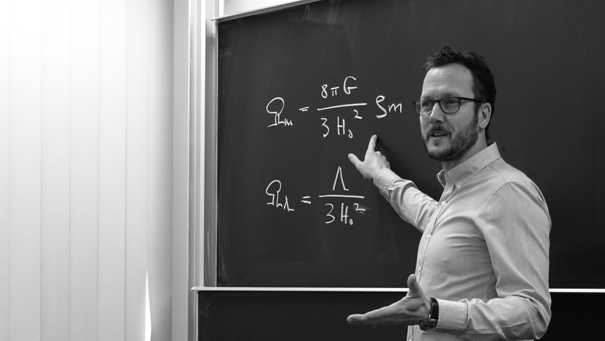Listed below are courses that I frequently teach at the University of Potsdam
as part of the bachelor and master programs in natural sciences.
Experimentalphysik I
Study program: Bachelor Geo Sciences, 1st semester, 4h per week + exercises
An introductory course (in german) in experimental physics covering classical mechanics, optics, gravity, energy- and momentum concervation, and other fundamental topics.
Einführung in die Astronomie
Study program: Bachelor Physics, 1st semester, 4h per week
An introductory course (in german) in astronomy providing a broad overview on the Universe and its componenents, inlcuding the solar system, the sun, stars and stellar evolution, galaxies, cosmology, and large-scale structure.
Grundkurs Astrophysik I+II
Study program: Bachelor Physics, 5th+6th semester, 2h per week + exercises
An fundametal course (in german) in astrophysics covering the physics behind the Univserse and its components. The course covers formation of stars and planets, the strucure of stars, radiation principles, nuclear burning in stars, interstellar matter, the physics of galaxies, cosmological equations, cosmological structure formation.
Lab course Astronomy
Study program: Bachelor Physics, 5th or 6th semester, 1h per week seminar + observing
An introductory lab course (in german) in astronomy where you learn how to use a telescope and its components, observe the moon and solar system obejcts, stellar clusters, and gaseous nebulae. Oberservations will be carried out using the training telescope (OST) on the roof of the physics buliding.
Galaxies and Cosmology
Study program: Master Astrophysics/Physics, 2nd semester, 3h per week + exercises
An advanced course (in english) in astrophysics covering structure and evolution of galaxies, stellar dynamics, interstellar shocks, relativistic cosmology, and cosmological structure formation.
The Interstellar Medium and Star Formation
Study program: Master Astrophysics/Physics, 1st or 2nd semester, 2h per week + exercises
An advanced course (in english) in astrophysics covering the phases of interstellar gas, radiative transfer, advanced atomic and molecular physics, radiation theory, spectroscopy, and shock physics.
The Intergalactic Medium and Large-Scale Structure
Study program: Master Astrophysics/Physics, 1st or 2nd semester, 2h per week + exercises
An advanced course (in english) in astrophysics covering gas physics at low densities, cosmological structure formation, Lyman alpha forest and the intergalactic medium, spectroscopical methods, reionization of the Universe, circumgalactic gas, the intracluster medium.
Frontiers in Extragalactic Astrophysics
Study program: Master Astrophysics/Physics, 2nd semester, 2h per week
An advanced course (in english) in astrophysics discussing recent developments in extragalactic astrophysics. In joint discussions, the implications of these results will be evaluated and compared to thr "standard" text-book astrophysics.
Scientific Writing in Astrophysics
Study program: Master Astrophysics/Physics, 2nd semester, 2h per week + exercises
A course (in english) that prepares master students for advanced scientific writing, with a focus on astrophysical texts. The course covers: abstract writing, paper writing, thesis writing, peer review processes, proposal writing, and job applications.
Lab course Astrophysics
Study program: Master Astrophysics/Physics, 1st or 2nd semester, 1h per week seminar + observing
An advanced lab course (in english) in astronomy where you learn how to carry out astrophysical observations using photometric and spectroscopic methods, how to use and program advanced data-analysis tools, and how discuss the results in the overall scientific context. Objects to be observd include individual stars and stellar clusters, the Sun, galaxies, and others. Oberservations will be carried out using the training telescope (OST) on the roof of the physics buliding and at the Einstein tower on the Telegrafenberg, Potsdam.
